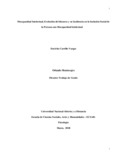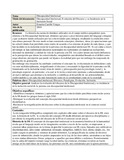Please use this identifier to cite or link to this item:
https://repository.unad.edu.co/handle/10596/17459Full metadata record
| DC Field | Value | Language |
|---|---|---|
| dc.contributor.advisor | Montenegro, Orlando | - |
| dc.coverage.spatial | cead_-_palmira | spa |
| dc.creator | Carrillo Vargas, Emerita | - |
| dc.date.accessioned | 2018-04-06T20:30:24Z | - |
| dc.date.available | 2018-04-06T20:30:24Z | - |
| dc.date.created | 2018-03-15 | - |
| dc.identifier.uri | https://repository.unad.edu.co/handle/10596/17459 | - |
| dc.description.abstract | El discurso de la discapacidad intelectual DI, ha estado compuesto por terminología que hace énfasis en lo que es diferente, o anormal, persistiendo en todo aquello que hace distinto a un individuo de los demás. “la discapacidad se asocia al par sano- enfermo y al par normal-anormal”. (Umaña, 2007, p.7). Generalmente estos discursos provienen de sistemas de poder y por lo tanto son aceptados como verdaderos e irrefutables por las colectividades, sin tomar en cuenta si obedecen o no a la realidad, perpetuándose a través del tiempo y conllevando a acciones que excluyen y discriman ha quien es categorizado como desigual. “La distribución de los sujetos que hablan en los diferentes tipos de discursos y la adecuación de los discursos a ciertas categorías de sujetos”. (Foucault, 1992, p.27): De este modo la presente investigación bibliográfica tiene como propósito realizar un análisis sobre la evolución del discurso de la discapacidad intelectual respecto a conceptos, apreciaciones, que cada época trajo consigo y su incidencia en la inclusión social de la persona con DI. | spa |
| dc.format | spa | |
| dc.format.mimetype | application/pdf | spa |
| dc.language.iso | spa | spa |
| dc.publisher | Universidad Nacional Abierta y a Distancia UNAD | spa |
| dc.title | Discapacidad Intelectual, Evolución del discurso y su Incidencia en la Inclusión Social de la Persona con Discapacidad Intelectual | spa |
| dc.type | Monografia | spa |
| dc.subject.keywords | Discapacidad Intelectual | spa |
| dc.subject.keywords | Discurso - Evolución | spa |
| dc.subject.keywords | Educación | spa |
| dc.subject.keywords | Paradigma | spa |
| dc.description.abstractenglish | The discourse of intellectual disability DI, has been composed of terminology that emphasizes what is different, or abnormal, persisting in everything that makes an individual different from others. "Disability is associated with the healthy-sick couple and the normal-abnormal pair". (Umaña, 2007, p.7). Generally these discourses come from systems of power and therefore are accepted as true and irrefutable by the collectivities, without taking into account whether they obey reality or not, perpetuating themselves through time and leading to actions that exclude and discriminate against who is categorized as unequal. "The distribution of the subjects who speak in the different types of discourses and the adequacy of the discourses to certain categories of subjects". (Foucault, 1992, p.27): In this way the present bibliographical investigation has as purpose to make an analysis on the evolution of the speech of the intellectual disability with respect to concepts, appreciations, that each period brought with it and its incidence in the social inclusion of the person with DI. | spa |
| dc.subject.category | Psicología | spa |
| dc.rights.accesRights | info:eu-repo/semantics/openAccess | spa |
| dc.rights.acceso | Abierto (Texto Completo) | spa |
| Appears in Collections: | Psicología | |
Files in This Item:
| File | Description | Size | Format | |
|---|---|---|---|---|
| 60409392.pdf | Discapacidad Intelectual, Evolución del discurso y su Incidencia en la Inclusión Social de la Persona con Discapacidad Intelectual | 567.42 kB | Adobe PDF |  View/Open |
| Resumen Analitico Especializado-Final Emerita Carrillo Vargas.pdf | 299.33 kB | Adobe PDF |  View/Open |
Items in DSpace are protected by copyright, with all rights reserved, unless otherwise indicated.
